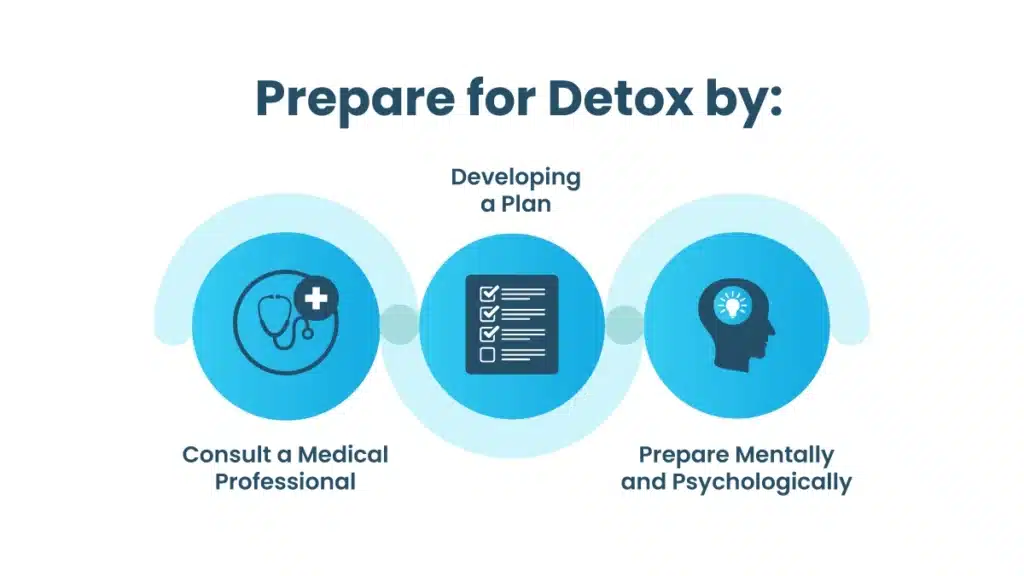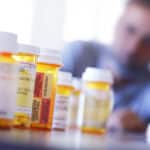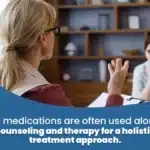Detoxing from prescription drugs can be challenging both physically and emotionally. With the right support and resources, achieving a successful recovery and regaining control of your health and well-being is possible.
The process of detoxing your body from prescription drugs may differ from person to person, depending on the medication type and individual health factors. The article covers the details of the detox process, addressing the challenges, key elements, and support systems involved.
Key Takeaways
Detoxing from prescription drugs is a critical process for individuals who have become dependent on or addicted to these medications. Here’s what you need to know:
- Understanding the differences between detoxing from prescription drugs and other substances is essential.
- Preparing for detox requires careful planning and consideration to ensure a safe and successful experience.
- Following detox, individuals require continued care to address lingering physical and psychological effects.
Connect with The Haven Detox-South Florida to get more information on addiction recovery by calling (561) 328-8627.

How Prescription Drugs Affect The Body
Prescription medications are drugs prescribed by healthcare professionals to treat medical conditions. They include a broad range of substances, such as pain relievers, antibiotics, antidepressants, and cholesterol-lowering drugs.
Prescription medications, especially those that are habit-forming or addictive, can bring about physical and psychological dependence. Unlike others, prescription drugs require a doctor’s authorization due to their potential for side effects and misuse.
The Detoxification Process
Detoxification or detox typically involves gradual tapering off the addictive substances to minimize withdrawal symptoms and potential complications. It’s important to note that detoxing from drugs can differ depending on the specific medication, its dosage, and the individual’s medical history.
The natural detox process in the human body is primarily carried out by organs such as the liver, kidneys, lungs, skin, and digestive system. These organs work collectively to filter out toxins, metabolize them into less harmful substances, and excrete them from the body through urine, sweat, breath, and bowel movements.
Why Detoxing From Prescription Drugs Is Different
When it comes to detoxing from prescription drugs, recognizing the distinctions between detoxing from other substance abuse is important. It presents unique challenges, which are discussed below:
Prolonged Effects Of Drugs On Your System
Prescription drugs often have a longer half-life compared to recreational drugs, meaning they stay in your system for an extended period. This prolonged presence can lead to a buildup of the drug in your body, making detoxification a more gradual process.
Risk Of Withdrawal Symptoms
Physical dependence on prescription drugs can result in significant withdrawal symptoms when you aim to stop using them. These symptoms vary from minor discomfort to severe complications depending on the drug type and the duration of drug use. Detoxing under medical supervision may be necessary to manage these symptoms safely.
By acknowledging and addressing these distinctions, individuals can approach prescription drug detoxification with greater awareness and preparedness.
How To Prepare For Detox
Starting a drug detox involves thoughtful planning and consideration to ensure a safe and successful journey towards recovery. Here are some essential steps:
Consult A Medical Professional
Before planning a detox program, it is necessary to consult with a medical professional, such as a doctor or drug addiction recovery specialist. They can assess your situation, provide guidance on the safest approach to detox, and monitor your progress throughout the process.
Develop A Detox Plan
Work with your healthcare provider to create a detailed detoxification plan tailored to your needs. This plan should outline the specific steps you’ll take, including the duration of detox, medications or supplements that may be necessary, and any additional support services you may require.
Emotional And Psychological Preparation
Detoxing from prescription drugs can be challenging both physically and emotionally. It’s essential to have a robust emotional support system that includes friends, family, and healthcare professionals who can offer encouragement, guidance, and assistance through these methods.
By following these steps and actively engaging in the detoxification journey, someone can increase the chances of a safe and successful outcome for long-term recovery.
The Detox Process: Step By Step
The drug detox program encompasses three pivotal stages, each demanding attention and deliberate effort for successful outcomes. Here’s a step-by-step breakdown:
Initial Stage: Natural Detoxification
During the initial detox stage, the body begins the natural detoxification process. This phase involves eliminating toxins and metabolic waste through the liver, kidneys, skin, and other organs. The best ways to promote the natural detoxification process are drinking plenty of water, eating healthy foods, and exercising regularly.
Middle Stage: Managing Withdrawal Symptoms
During the middle stage of detox, individuals may encounter drug withdrawal symptoms as their bodies adjust to the absence of the prescription drug. Physical symptoms can vary and may include anxiety, insomnia, nausea, and muscle aches.
Medical care and support are vital during this stage to prevent life-threatening withdrawal symptoms safely and improve comfort.
Final Stage: Post-Detox Recovery
The final stage of detox marks the transition to post-detox recovery, where individuals focus on maintaining sobriety and rebuilding their lives. This stage may involve ongoing therapy, support group participation, and lifestyle changes to address underlying issues contributing to substance use disorder. Healthy habits, developing coping skills, and building a strong support network are essential to recovery for a long time.
By traversing these stages with determination and support, individuals can emerge from detoxification with newfound strength and resilience.
Key Elements Of A Drug Detox Routine
Adopting a healthy routine during prescription drug detox programs is the first step toward recovery and maintaining mental stability. Here are some key elements:
Eating Healthy
Eating healthy plays a pivotal role in supporting the body’s recovery process. A nutrient-rich diet helps replenish depleted resources, repair tissues, and boost overall health. Consuming fresh fruits, vegetables, lean proteins, and whole grains aids in stabilizing blood sugar and energy levels, promoting digestion, and enhancing mood, which is essential during detoxification.
Adequate Hydration
Water is essential for various physiological functions, including flushing out harmful substances through urine, sweat, and bowel movements. Proper water intake prevents dehydration, which can result in most severe withdrawal symptoms and impair organ functions. Alongside water, herbal teas and electrolyte-rich beverages can provide additional hydration and support.
Regular Exercise
Moderate aerobic exercises such as walking, jogging, or cycling help stimulate circulation, promote lymphatic drainage, and enhance cardiovascular health. Daily exercise also triggers the release of endorphins, natural chemicals that reduce stress, alleviate discomfort, and improve mood, which are particularly beneficial during withdrawal.
Incorporating these essential components into a prescription drug detox method not only supports the body’s healing process but also fosters a productive mindset.
Important Considerations During Detox
Embarking on a detox journey necessitates a nuanced understanding of potential risks and strategies to address the possibility of relapse. Some important considerations are discussed below:
Understand The Potential Risks
Detoxification can pose various risks to physical and mental health. Withdrawal symptoms like nausea and anxiety, alongside dehydration and electrolyte imbalances, are common challenges. Recognizing these risks empowers individuals to prepare adequately and seek necessary medical support, ensuring a safer detox process.
Dealing With The Possibility Of Relapse
Relapse is a significant concern during detox and recovery. Establishing coping mechanisms, such as building a robust support network and engaging in therapy, helps individuals navigate triggers and cravings. Acknowledging the potential for setbacks and developing resilience strategies are crucial aspects of a successful detox journey.
Support During The Detox Process
During the detox, support is crucial for physical and emotional well-being. Support includes:
- Medically supervised detox to manage severe symptoms.
- Counseling to address underlying issues.
- Encouragement from loved ones.
Peer support groups offer understanding and solidarity, while holistic approaches like mindfulness and nutrition help sustain motivation and health.
Ultimately, individuals can cultivate resilience and sustain motivation for long-term recovery by prioritizing physical and emotional well-being during detox.
Post-Detox Care
Following detox, individuals require continued care to address lingering physical and psychological effects. Post-detox care ensures a smoother transition into sober living.
Below is an enumeration of some post-detox support practices:
Ongoing Therapy For Long-Term Recovery
Therapeutic interventions are vital for addressing the underlying causes of prescription drug abuse and promoting lasting recovery. Ongoing therapy allows patients to explore triggers, develop coping mechanisms, and enhance resilience. Through regular sessions, individuals can address emotional challenges and maintain progress toward a fulfilling, substance-free life.
Maintaining A Healthy Lifestyle
Maintaining a healthy lifestyle post-detox is important for sustaining recovery and promoting overall well-being. Good health includes eating nutritious food, regular exercise, and adequate sleep. Adopting stress management techniques and engaging in fulfilling activities can help prevent relapse and enhance quality of life.
Establishing a comprehensive aftercare plan helps people maintain sobriety, address underlying issues, and achieve a substance-free life with confidence.
Frequently Asked Questions (FAQ)
What is involved in the detoxification of drugs?
Drug detox refers to the process of removing harmful substances, including alcohol, from the body and preventing symptoms of withdrawal caused by discontinuing drug use. It typically includes medical supervision, assessment, and supportive care to ensure safety and comfort.
Depending on the substance and individual factors, detox may involve medications to alleviate the severity of withdrawal symptoms, such as anxiety, nausea, and cravings. Monitoring vital signs, hydration, and nutritional support are also common. Detoxification aims to stabilize individuals physically while preparing them for further treatment or rehabilitation to address the underlying issues of addiction.
Can I do a detox while on medication?
Whether you can undergo detoxification while on medication depends on various factors, including the type of medication, the reason for taking it, and the specific detox protocol. In some cases, medications may be necessary to manage withdrawal symptoms or address underlying health conditions during detox.
Abruptly discontinuing certain medications can be dangerous. Getting medical professional help is vital before planning a detox at home. They can offer personalized guidance, make necessary medication adjustments, and monitor your progress to enhance safety and effectiveness. Keeping open discussions with your healthcare provider is essential for informed decision-making regarding your health.
How long does it typically take to detox from prescription drugs?
The duration of the prescription medication detox process varies based on the drug type and dose, duration of drug use, and individual health problems. Generally, medical detox can take from a few days to several weeks.
For short-acting prescription drugs, such as certain opioids or benzodiazepines, withdrawal symptoms may begin within a few hours to a day after the last dose and typically peak within a few days. The acute withdrawal phase might last from about a week to ten days. In contrast, long-acting prescription drug withdrawal symptoms can start within a couple of days and might last for several weeks.
The Haven Detox-South Florida Where Wellness Awaits
At The Haven Detox-South Florida, we are dedicated to guiding you on your path to recovery.
Our detox service safely manages withdrawal symptoms under medical supervision, ensuring comfort and safety. Our residential treatment program provides a controlled and supportive setting where you can emphasize your healing process.
Additionally, our IV therapy replenishes essential nutrients and helps restore physical health, boosting your overall well-being.Don’t wait for a new beginning. Call us at (561) 328-8627 to learn more about our services and how we can help you achieve lasting recovery.






